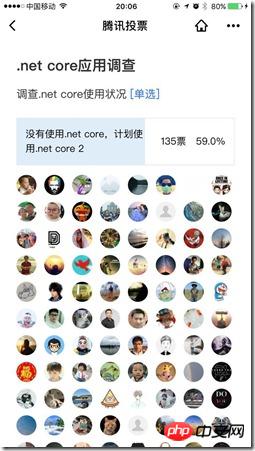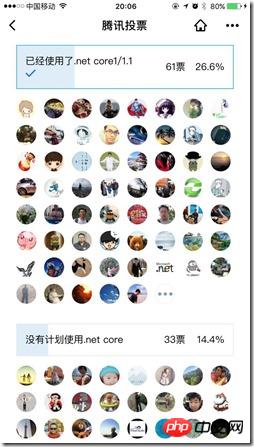Home >Backend Development >C#.Net Tutorial >Sharing of problems encountered while learning ASP.NET Core 2
Sharing of problems encountered while learning ASP.NET Core 2
- 零下一度Original
- 2017-06-24 09:55:111531browse
. NET Core was released on June 28, 2016. Nearly a year has passed. However, at work, I found that everyone’s acceptance of .net core is not high. This is just a feeling. As the saying goes, "There is no survey." I have no right to speak." I conducted a survey in the WeChat group through the WeChat mini program in the past two days. The number of participants was about 230. Judging from the results, everyone is waiting for .NET Core 2.0. It is expected that .net core 2 will be released in 7 and 7. Released on time in August. The question of this survey is to investigate everyone’s usage of .net core. It is divided into 3 situations. I will go directly to the WeChat voting results chart:


Only 26% of people use .net core 1.0/1.1, 59% plan to use .net core 2, and only 14.4% have no plans to use .net core. Judging from this result, everyone is still looking forward to .net core 2.
.net core is the next generation platform of .net framework. The biggest change is ASP.NET Core. Most of the current hot topics of ASP.NET Core are around its cross-platform experience. Although this is A great achievement, but not a plus if you're a regular ASP.NET user who writes a lot of basic .NET 4.x code and plan to continue using the familiar IIS and Windows environment. This also well explains the reason why the proportion of users currently using .net core 1/1.1 is not high.
Looking Back When the ASP.NET team designed the ASP.NET framework 15 years ago, they adopted most of ASP's best practices and adopted these practices in the new framework. Along the way, they also introduced a lot of new content, such as compiled and managed code, automatic postbacks, and server controls. ASP.NET Core evolves in the same way. Common ASP.NET best practices (such as initial loading of configuration data, dependency injection, NuGet packages, claims-based authentication, and Razor improvements) are native features of ASP.NET Core. ASP.NET Core also features a different startup process, more modular request-response middleware, and a more flexible infrastructure for defining controllers and views. ASP.NET Core is also a cross-platform framework that makes it easy for you to develop and deploy applications on Windows, macOS, and Linux. In this way, ASP.NET Core will force you to write better quality code, that is, it will force separation of concerns by default. Of course, you can also achieve this goal through self-discipline. There are very few ways of self-discipline.
For any form of new project (product) development, ASP.NET Core is definitely the first choice. The API of .NET Core 2.0 has been aligned with .NET Framework 4.6.2, which explains it very well. Most users plan to adopt .NET Core 2. However, as a completely new framework, some initial costs are inevitable: All team members must be proficient in the framework. Additionally, all members must be proficient in the Model-View-Controller (MVC) application model.
The above is the detailed content of Sharing of problems encountered while learning ASP.NET Core 2. For more information, please follow other related articles on the PHP Chinese website!

